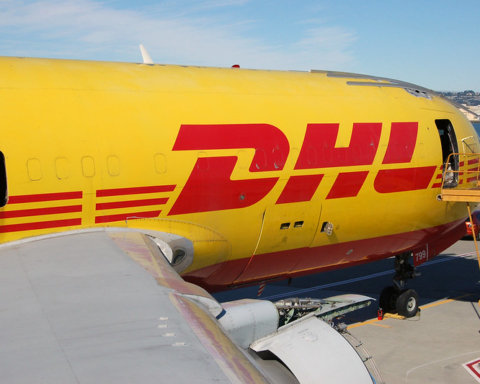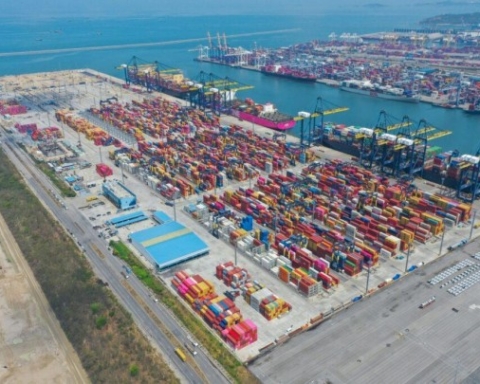Europe, Italy and the Red Sea crisis. At the Caffé della Versiliana, the famous cultural centre promoted and organized by the Versiliana Foundation in collaboration with Pietrasanta Municipality and with the support of Tuscany Regional Administration and Toscana Promozione Turistica (Tuscany Regional Government Agency responsible for promoting tourism- Translator’s Note), now in its 45th year, the Deputy Minister for Infrastructure and Transport, Edoardo Rixi, took stock of the current international geopolitical situation and the impact it is having on shipping trade dynamics.
“The global scenario has changed,” he said during a face-to-face discussion with the Managing Director of the North Tyrrhenian Port Network Authority, Matteo Paroli. “German industry, which for the past 150 years has always looked east for the supply of raw materials, is now isolated from the main logistics routes. The Baltic Sea, where the port of Hamburg used to do transshipment to Russia, has lost this strategic purpose for Germany because the borders are barred.”
The escalation of tension in the Red Sea and the series of crises over the last few years, especially the one triggered by the war in Ukraine, has, in short, put Europe into a corner: “Meanwhile,” Mr Rixi recalled, “we should not forget that Great Britain has left Europe, we are talking about one of the few European countries that has a maritime vision. If we exclude Holland, which is not a great nation, the only country to have a vocation on a par with the United Kingdom is Italy.”
Yes, Italy: “The Bel Paese has been increasingly opening itself up to the sea, because it has a central position in the Mediterranean and because it is facing a continent, Africa, which. according to the latest forecasts. is the one that is going to have the greatest economic growth in the next twenty years.”
According to the deputy minister, the Dark Continent does not have a clear geopolitical position to date, unlike South-East Asia, which is dominated by China and India, and unlike the Middle East, which is dominated by Israel and Saudi Arabia.
This is where Europe has to start. “The EU, and Italy in particular, has the task of finding new, resilient, flexible logistics routes and making full use of its maritime vocation.” Because, this is the point, no other continent can boast a tradition in shipping and logistics on a par with Europe. “We have the most important cargo fleet globally, with MSC owning 20% of the world’s container ships, and the chairman of the International Chamber of Shipping is Manuel Grimaldi, the top RO/RO operator internationally. If we add Maersk, Hapag Lloyd and the other big players to the mix, we are undoubtedly in a leading position.”
Hence the strategic importance “of adapting our rules and our vision on the sea to the international context.” According to Mr. Rixi, our goal should be to make Italy central at global level. “First of all, due to its position, because the EU without the Mediterranean has no stability.” In addition, “because we have a maritime capacity that not even the North American continent has. Unlike the latter, in fact, overtime, the EU has been able to develop a manufacturing industry with an international output.”
One thing for Rixi is clear: “The centrality of Europe on shipping routes is what the resilience of our value chain will be developed on. We do not know what the next geopolitical crisis that we will have to face will be. This is why Europe needs to have a foothold on other continents, also because it is not self-sufficient like North America. Without commercial bases outside our continent, European industry appears to be over-productive compared to the intra-community market needs. In this respect we are more globalized than others.”
In Mr Rixi’s view Africa is where we should be aiming for. “There’s a reason why The Italian government has relaunched the Mattei plan. The problem today is to prevent someone else from taking possession of the African coasts. I’m thinking, obviously, of China, which has a very strong foothold in the continent.”
North Africa also needs to be watched for another reason, because of the extension of the Emissions Trading Scheme (ETS) and carbon taxes to shipping: “It was an unfortunate choice by Europe to apply the ETS to maritime transport,” Mr. Rixi admits. adding: “Ships sail and if one continent applies a tax and another doesn’t, obviously shipping companies favour the latter. This is one of the reasons why boxships now prefer to call at Tunis or Tangier rather than Gioia Tauro. They unload their goods at North African ports and then re-route them to Italian ports on smaller ships. Until recently, however, containerships came to Livorno or Genoa, where the goods were then redistributed to Spain or France.”
In short, it is clear that the ETS risks becoming a competitive advantage for Africa, an advantage that its ports can exploit to the disadvantage of European ports and to the detriment of environmental sustainability. Therefore, by choosing Africa, shipping lines are not motivated to renew their fleet to make it more environmentally sustainable. At the end of the day, the risk is that the old ships will continue to operate and not even CO2 emissions will be reduced. That is why Africa has to be kept a close eye on: you cannot think of developing an economy on the basis of non-compliance with the rules in force in Europe.”
As for Italy, Mr. Rixi remains convinced that the country needs to set up a more efficient port system with a more homogeneous vision: “Our country,” he says, “caters for 70% of national industry with its logistics chain. We have to get to 100%. We also have to become a point of reference for Central European markets. With global scenarios being redefined, Europe can no longer rely on Northern Range ports. If the Red Sea crisis initially led to freight rates increasing on link services with the Mediterranean, tariffs on these routes are now cheaper than the ones on ships sailing to Northern Europe.”
The deputy minister confirms the strategic importance of strengthening the levers for coordinating the development strategies of the national port system. What about differentiated autonomy? In Mr Rixi’s view, it represents an opportunity for regional areas that want to develop their maritime vocation, Tuscany, in particular. Mr. Rixi’s observations show, in a nutshell, how Regional Administrations gaining special forms of autonomy on a matter that is in competition with the state does not interfere with the perspective the government and the Ministry of Transport & Infrastructure have been trying to work on over the last few months, developing, in the context of a possible reform of law 84/94, a vision that would favour the development of a centralized coordination model for port issues, along the lines of the Spanish Puertos del Estado model.
Translation by Giles Foster




